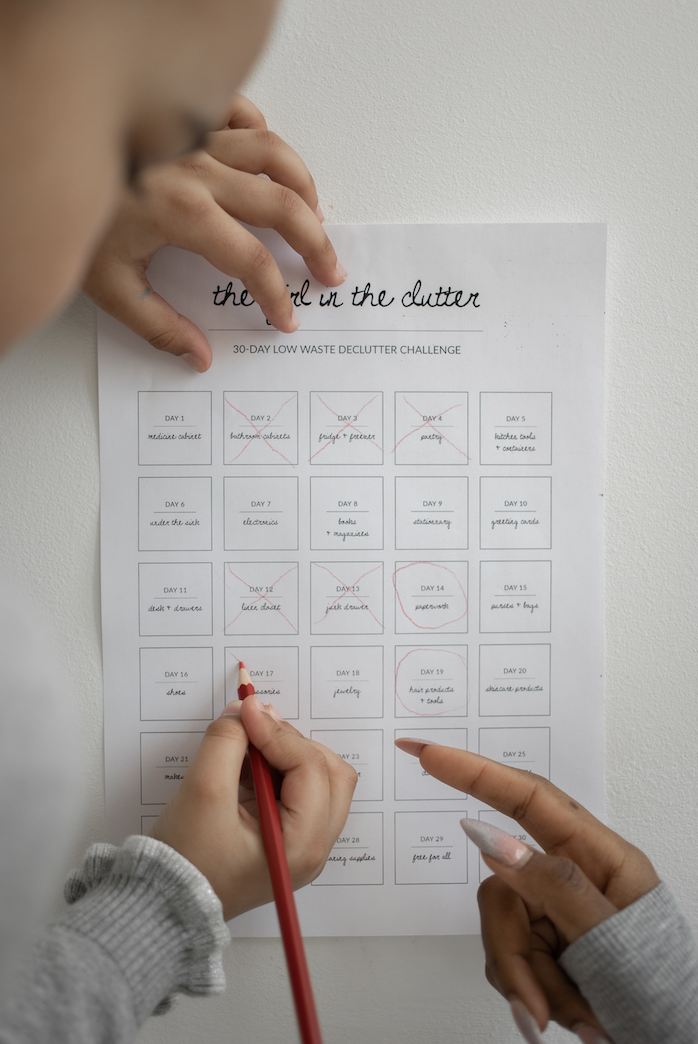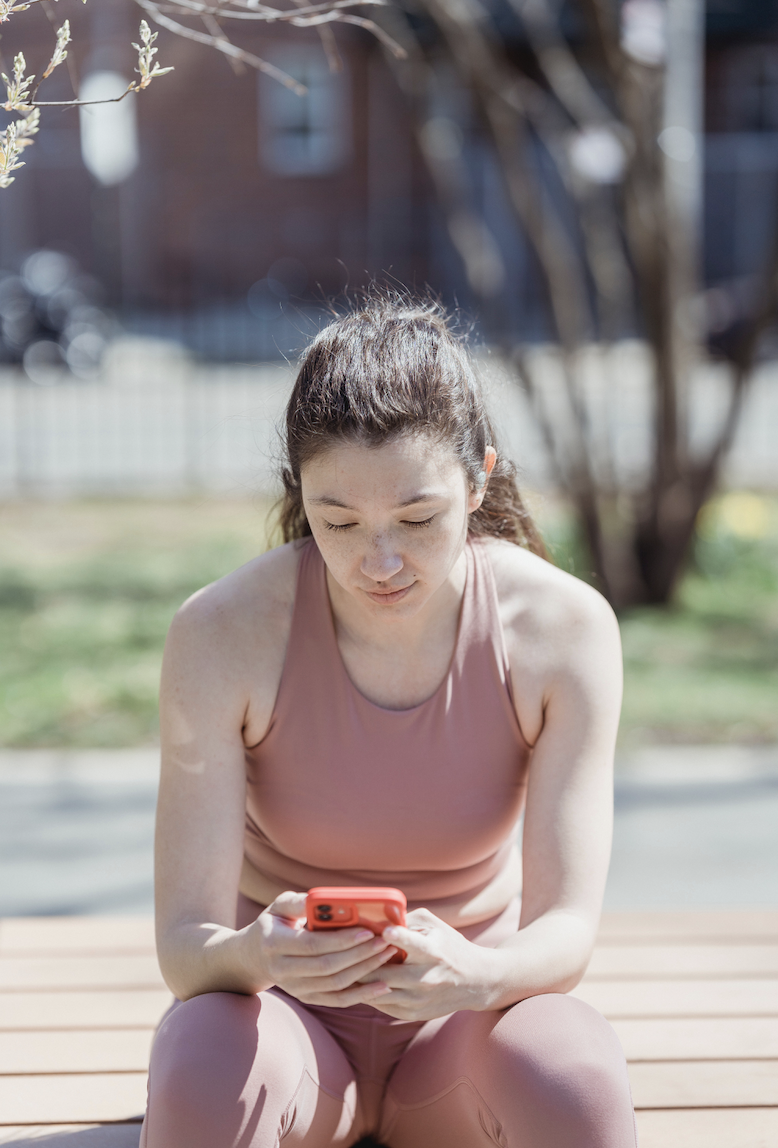
These days, there’s an app for everything. And for our gadget-reliant selves, that’s great news. Whether you’re trying to restart your exercise regimen, begin a meditation practice, or eat healthier, habit trackers or habit-tracking apps are now available at your fingertips to forge a healthier, happier you.
But wait, just before you go ahead and download a habit tracker right now, ask yourself this question first: what is a habit tracker and will it really help you? Can they deliver the promise of helping you build better habits? To get the answers, let’s take a deep dive into the psychology behind habit trackers, and how they were built to motivate you to become your better self. Who knows, this might just be the push you need to finally slay your health goals.

What are habit trackers?
First things first: a word on habit trackers, what are they? A habit tracker is a way to measure whether you did a habit. Pre-Internet and smart phones era, a habit tracker is noting down your behaviors, and jotting down your progress on a piece of paper or a calendar. As simple as that. It’s up to you to check on your progress, whether that’s on a weekly or monthly basis.
Now, habit-tracking apps are essentially the same. They know for a fact that tracking behavior will increase the livelihood of establishing healthy habits. But the apps have set out to do something more. By studying how humans think and the science behind habits, they’ve crafted, curated and designed their apps to help you make habits stick, which leads us to the next question.

How do habit trackers work?
Pulitzer Prize-winning journalist Charles Duhigg wondered how he could stop eating ice cream at 11 PM, smoking tobacco, or procrastinating. He went beyond wondering and researched the science behind habits, and even wrote books about it, including The Power of Habit.
According to Duhigg, a habit has a three-basic structure he calls the “habit loop” or the 3 Rs—reminder, routine, and reward. For example, if you’re trying to accomplish a certain number of steps a day, you set a reminder in your phone as in “it’s already 3 PM, you still have 5,000 steps to go!” So, you go out for a stroll (the routine) and enjoy the reward after, say a cup of your favorite tea or smoothie.
There’s a whole slew of habit trackers in the app store, and they vary by features or interfaces, but all of them operate around the same psychology: the three Rs.
For example, Streaks is able to show you how many days you’ve completed the habit, encouraging you to keep the streak going as long as you can. With a few taps on the app, it can show you charts or tables to provide a bird’s eye view of where you are in your goals. Some apps, like Habitica, even reward users with badges and other incentives. Another app, Plant Nanny, lets you take care of an actual plant to encourage you to drink more water. When the plant’s hydrated, it’s happy and smiling. When it’s famished, it makes sad faces and eventually dies, pretty much like your Tamagotchi.
Going back, given that the three Rs are science-backed, is this guarantee that habit-tracking apps will work for you?

Not one-size fits all
Well, it depends. There’s a reason why there are so many kinds of habit tracking apps, no single type of app will work for everyone. We have different personalities, motivations and lifestyle needs. Take it from Gretchen Rubin, who has written several books about habits, including Better Than Before.
“There’s no one size fits all when it comes to building habits. It can work but it highly depends on the person and how he or she will respond.” Rubin formulated a theory, which she calls four habit-formation tendencies. These tendencies label people into four categories:
- Upholders— disciplined and respond to both internal and external expectations.
- Obligers — who can’t keep commitments to themselves but respond to expectations from others (they respond well to outer accountability).
- Questioners — who ask why and can keep a habit if they understand the logic and reasoning behind it.
- Rebels — who hate being told what to do by others — so it has to be something theywant to do.
In general, the apps work around or target these types of people. Obviously, the upholders are the easiest to please. Obligers, on the other hand, will benefit more from community-based habit trackers. HabitShare, for example, allows you to celebrate your wins and compare notes with your friends and followers. Questioners will want a feature where the science behind the habit is explained in touchpoints. Perhaps an app that’s both a repository of information, as well as a habit tracker, will do them good. Rebels, well, they’re the hardest to get on board. According to Rubin, they might even find push notifications annoying, and eventually uninstall the app.
The trick? Find an app that caters well to your habit-formation tendency. Don’t just download any app. Here are some guidelines you can use before you start using a habit tracking app.

Questions to Help You Choose the Best Habit Tracking App
- Do you want something simple that checks in with you daily? (Suggested App: Habit)
- Are you the kind of person who finds streaks rewarding, such as tracking how long you’ve kept at it? (Suggested Apps: Streaks, Done, Productive)
- Will you thrive more in an app that lets you track habits with your friends? (Suggested App: HabitShare, MyRule, Kin)
- Do you want a tracker that helps you specifically for a morning or evening routine? (Suggested App: Morning Routine)
- Do you want tangible advice on habit formation as well as the ability to make sense of your behaviors and its patterns? (Suggested App: Strides)
- Do you want a habit tracker that lets you hire a personal coach as well? (Suggested App: Coach.me)
So should you get a habit tracking app?
Our verdict: yes, definitely. Not only will a habit tracker help you build healthier habits. Studies show a habit tracker can also give your mental health a boost.
In a 2020 study, Marco Stojanovic and his colleagues found that students who logged their study patterns were able to improve their study habits. Not only that, most of them experienced improved better mood levels and felt more motivated.
Further, habit-tracking cues us to celebrate micro-wins throughout your personal growth journey. For example, if you’ve intermittently fasted for a week, the habit tracker will congratulate you. And you experience a rush of dopamine, and a sense of accomplishment even before the effects of intermittent fasting starts to show.

Another advantage is that it can remind us to act. Our lives have changed drastically in the past few decades. We’re often buried under a thick pile of deadlines that it’s impossible to remember the task. Habit trackers, especially a digital one, will cut through the noise and send us reminders throughout the day. Gradually, the more you accomplish the tasks, the more they turn into habits, and finally, become automatic to you.
The takeaway
Using a habit tracker can be beneficial, but let’s be honest. There’s no magic app. Downloading an app and using it won’t make you lose weight and being physically fit. At the end of the day, it can’t force you to leave your couch, put on your running shoes, and actually follow through. In the end, you’ll have to do all the work.
So don’t forget, your willpower has to be strong enough for you to be able to achieve the transformation and growth you desire. Use these tools, yes, but at the end of the day, you and only you will hold yourself accountable As Vox beautifully puts it in a similar story, you can’t app your way to a better self.
What do you think of habit tracking apps? Do you use and how did it benefit you? Tell us in the comments.
Tags
References:
https://www.vox.com/the-goods/2019/1/2/18158989/habit-tracking-apps-new-years-resolutions
https://www.shape.com/lifestyle/mind-and-body/mental-health/habit-trackers
https://pubmed.ncbi.nlm.nih.gov/32116961/
https://knowablemagazine.org/article/mind/2021/the-science-habits



0 Comments